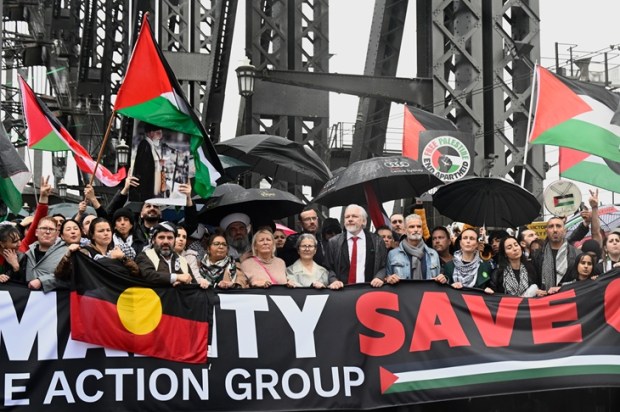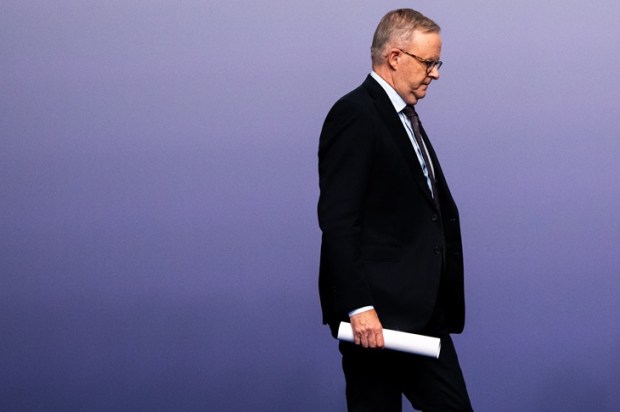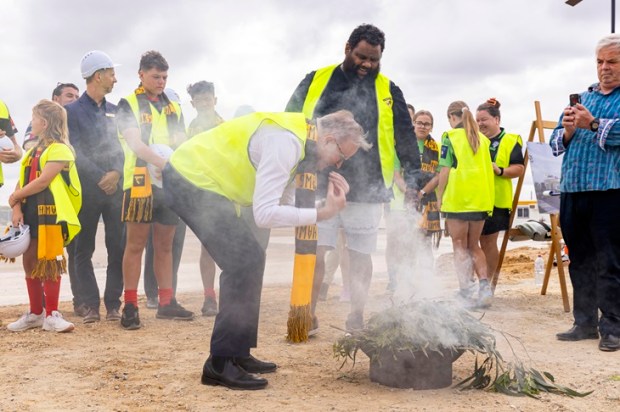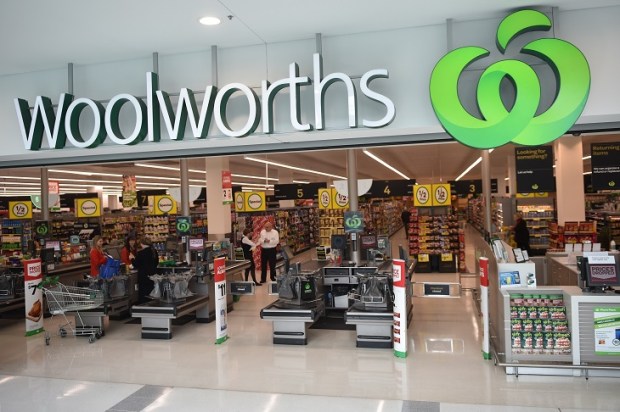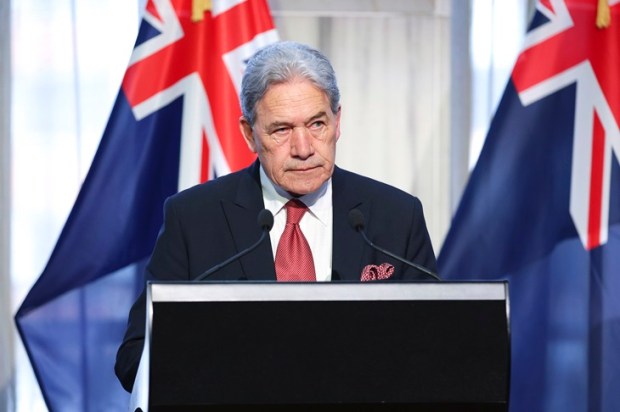Around 32 per cent of Australian voters gave Labor their first preference in 2022.
No ringing endorsement, despite a decade of ignominious and corrupted Liberal rule. (Yes, the Nats were there too, but after their simply waving Malcolm Turnbull through to the leadership in 2015, they don’t deserve joint billing). Certainly, there was no mandate. Labor scraped into office with preferences from parties to their left. Airbus Albo, aka the cosplayer (he likes to dress up in uniforms) and the barnacle (he likes attaching himself to what he sees as popular causes), just made it.
The debate over the correct voting behaviour of conservatives, centrists, and populists rages on. I am firmly in the camp of the UniParty and of the need always to punish bad governments. Sadly, these days, mostly this is easy. No one can remember a good government in Australia. Abbott’s might have been. We will never know. I recently dared, as a colonial, to offer the Brits some gratuitous advice on their forthcoming election (4 July).
What if the alternative is worse? There is an argument that Albo is worse than the other lot. Perhaps it is blindingly obvious. Recently a regular writer at Quadrant Online, Peter O’Brien, wrote about Airbus with the following headline: A Man with Few if Any Redeeming Qualities.
He went on:
One tends to be instinctively antipathetic to political opponents, even allowing that you might agree with some of their policies. It’s a visceral, not an intellectual, reaction. You will probably notice how it can even extend to physical appearance – or is it my imagination that his smile is a weird rictus?
It’s not universal. Gough Whitlam, until recently our worst Prime Minister, was a hard man to dislike. All (or most of) his disasters were made with good intentions. Disliking Paul Keating, on the other hand, was a doddle, and continues to be so.
Albanese, however, is in a different league. The Office of Prime Minister has seriously exposed this hollow man … I have found it easier and easier to dislike him. With his recent moral vacuity on Israel and the ICC, he has now achieved the ultimate nadir. He is contemptible.
Well, yes, he is. No arguments with any of the above.
We will all have our unfavourite Albo policies. Funding UNRWA? The renewables madness? The Voice? The gift of $600 million to Papua New Guinea to establish an NRL team? The Digital ID? Mark Butler’s cheer-squadding of the World Health Organisation’s Pandemic Treaty? The unleashing of the eSafety Commissioner on free speech online? The failure to conduct a proper inquiry into Covid management? Failing to stem the runaway corruption and waste contained in the NDIS (National Disability Insurance Scheme), an un-needed Labor socialist invention of a decade or so ago? Supporting the case for Palestine to be admitted to the UN? Upping the ante on our mass immigration policies?
It is an impressive list. Not bad for a mere two-and-a-bit years’ work. A candidate both for Australia’s worst ever government, and for a rare case of the dismissal of a first-term government, at the next election. Not even worthy of the paltry 32 per cent support he garnered. Albo even makes Bill Shorten look good. Well, goodish. He even makes Whitlam look moderate. Sort of.
Bad policy can be defined in a number of ways, a bit like judging good and bad governments and good and bad prime ministers. What are the criteria? Well, policies might be bad because:
- No one wants them.
- They were not discussed in the election campaign, or at least they weren’t emphasised.
- They ignore current circumstances.
- They are dangerous to either the economy or to social harmony or our international standing.
- They may have unforeseen consequences of a nasty nature.
- They are not needed; they address a non-problem.
Even a cursory look at the Labor policies mentioned here, by no means the complete list of disasters, shows failure on all of the above criteria for judging bad policy.
Normally – what is normal in politics or anything else any more? – you might expect a governing party with a slender level of support and absolutely no mandate to be cautious and sensible in its first term. In order not to frighten the horses, to demonstrate its capacity to govern to those unsure of its intentions and capability, to win over its opponents and swinging voters. And to save more radical changes, if any, until the second term.
Given the list outlined above, it is clear that Albanese and his hucksters, either maniacally ideological or bungling fools, or both, decided not to follow the cautious approach. They act as though we wanted them there! Yes, I realise that every government thinks it has a mandate to govern. But this lot have taken this tendency to another level.
When bad governments are thrown out on their own dismal records – think Morrison, Perrottet (remember him?), and the coming British Sunak carnage in July – and there is a mediocre replacement, well, we are left with a democratic stalemate. No one is happy. The new government is not the answer. It is there on sufferance, and no one is enthusiastic.
By instantly being awful, Albanese has broken this mould. He, like Whitlam, has created a crisis of governance. His policies are dangerous, not just disappointing. He has created the pre-conditions for a counter-revolution, against not only the current government, but against the previous one as well.
This sets up an interesting scenario. A crisis of legitimacy. An existential threat to the polity. A ‘how did we get here?’ reaction. Whitlam energised a whole generation of counter-revolutionary voters. They didn’t take to the streets in late 1975. That was left to the whinging leftists who screamed ‘unfair’ and burned effigies of John Kerr and shouted endless epithets at everyone in their sights. The voters saved their extreme anger for the ballot box. They were willing to reward, electorally, the anti-Whitlam, twice over. Two landslides in a row. The people, then, thought that things were that bad.
So, we have established that we didn’t want Albo, and he has been a disaster. And his disaster has a precedent, back in the long distant 1970s. Where does this leave the broader question of ‘what to do now?’
Well, the answer lies with Peter Dutton. The last few elections have shown us that the pro-freedom micro parties have failed to excite the electorate. So, we come back to the failed Liberals. Notwithstanding all that we know about the UniParty theory.
The model for a leader of the Opposition faced with a disastrous government turns out to be … Malcolm Fraser. Along with Gough Whitlam and Tony Abbott, he was one of the three greatest Opposition leaders we have had. The governments they faced, certainly in the cases of Fraser and Abbott, were on the verge of being extinction level events for the nation. Whitlam only just scraped in in 1972 with only a handful of seats to spare, contrary to the leftist historical narrative that has forever since asserted a popular revolution. The other two Opposition stars romped in.
Fraser’s skill was to present the facts of the crisis and to promise decisive corrective action. And he had a good backing team. Think Tony Staley, the gentleman fixer; Phil Lynch, armed with his very helpful Treasury moles; the then attack-dog Reg Withers in the Senate; and a certain backroom, academic political philosopher called David Kemp. (Later a Howard government minister and, in ‘retirement’, the author of a multiple volume history of liberalism in Australia.)
Kemp penned a decisive article in 1973, called A Leader and a Philosopher, that, in short order, unified and galvanised the Liberals, created the spine needed to counter Whitlam and provided a focus for action in opposition. Kemp’s short but powerful and impactful piece paved the way for Fraser’s takeover of the Liberal Party. It was a legendary contribution. It was written to get rid of an ineffectual leader (Billy Snedden) and to install Fraser.
The stern persona of the leader and the sheer scariness of the incumbent were enough to create the counter-revolution.
We have, now, the scary government of all scary governments. Scary in the 1970s doesn’t hold a candle to scary in the 2020s. But will the 1975 model work in our current situation?
The seventies now seem like a foreign country. There wasn’t a Woke generation. There were no Greens. There were no Teals. There were no social media pile-ons. There were few Liberal ‘wets’, and their influence in the Liberal Party was confined to a few contested policies. There were no Liberal factions intent on tearing down conservatives. The legacy media weren’t totally owned by globalists. The Canberra bureaucracy was moderately non-aligned. There was a clearly defined middle class which felt threatened by Gough and Jim Cairns and Rex Connor and the rest of them. There were voters prepared to be seriously scared and prepared to execute the big switch. (They were still there in 1996 and in 2013.) Perhaps not, now. And there was the possibility of a conservative majority in the Senate. Fraser didn’t use it, of course, but that is another story.
So, we may be reduced to hoping that the Albo government will implode. Don’t give up hope. Chances are, they will.
Which brings us to the point.
Perhaps we needed an experience of awful and dangerous government to trigger a counter-revolution. Nothing else has worked to date with the insipid Liberals. And, boy, have we been landed with such a government. Maybe that will work, even in the weird political times that we now inhabit.
Keep voting out bad governments? Is it the only electoral strategy open to the perennially disillusioned?
But the counter-revolution needs a strategy for the ages. And the A team to match the task. Malcolm Fraser had his philosopher and A team to hand. The Liberals already have their Fraser. Potentially. They don’t need to get rid of another ineffectual leader. If even the Liberal wets, the Birmingham class, get the crisis and the threat, there might be hope.
Peter Dutton may or may not see the size and shape and nature of the political crisis we face, and may or may not be up for leading a counter-revolution. It needs far more than a clever election strategy. More than marketing. Slogans. Faction management. BAU politics. It needs a leader and a philosophy. Perhaps Dutton should give David Kemp a call.
This is where the voters come in.
To date, we have disgruntled ex-Liberals and populists rightly cranky with the sell-outs of the past and with limp, Labor-lite facsimiles of the once great party of Menzies, voting for micro-parties that have gone nowhere electorally. A leader of Fraser’s (or Menzies’) acumen would be thinking – how do I build the new 2020s coalition of the disaffected? The silenced? The fearful? How do I engage with the freedom movement? How do I convince those who have given up on us to think again?
Perhaps we needed the awful Albanese wake-up call to get what the problem is. For the Liberals. For the disgruntled populists. And for the nation.


